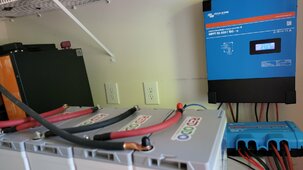kcbuild
New Member
I have a off-grid island cabin running on an Outback system centered on a 24V FX3524 inverter installed in 2007. This is part of an old-school prebuilt system that includes the inverter, AC and DC breaker boxes and the charge controller together on a single mounting plate. Over the years I swapped out to an FM-80 charge controller and a Mate3s so that I could take advantage of Outback’s internet monitoring and control system (Optics RE).
Flash forward to 2024, and the FX3524 continues to chug along, but for a variety of reasons, it is time to upgrade to 48V and lithium. The dilemma I face is that the simplest move would be to buy the modern versions of the Outback FX inverter (VFX3548) and charge controller (FM-100). These could be dropped into place on the existing mounting plate, and with a few breaker swaps, the upgrade would be finished. Another point favoring Outback is that my local solar installer primarily installs Outback systems.
I am wary of Outback though. Over the intervening decades, Outback has been bought and sold several times, and they were just purchased by Big Battery. This has not been widely announced, but the new president of Outback acknowledged the purchase and engaged with the Outback User Forum community recently regarding a nearly-week-long outage of the Optics RE online communication system. Even before this latest sale, I felt like Outback was adrift, especially with respect to the off-grid market. I suspect Outback hardware purchased now would be nearly as robust as their older hardware, but I am particularly concerned about the long-term prospects for Optics RE since remote monitoring and control are critical for my use case.
So, do I go with the simple (and thus less expensive) choice, stick with Outback and roll the dice that the new owners of Outback will support the hardware and monitoring software long term? Or do I look elsewhere? Given my situation, I would like to go with a well-established manufacturer with good remote monitoring and controls. I am already partially in the Victron world on the battery side so it would be a reasonable choice. A Midnite system is also a consideration, but the equivalent Rosie/Classic combo would be pricey, and I’m not sure I can wait until Midnite’s new AIO is available.
I know there is no single right answer here, but any thoughts and suggestions would be appreciated.
Flash forward to 2024, and the FX3524 continues to chug along, but for a variety of reasons, it is time to upgrade to 48V and lithium. The dilemma I face is that the simplest move would be to buy the modern versions of the Outback FX inverter (VFX3548) and charge controller (FM-100). These could be dropped into place on the existing mounting plate, and with a few breaker swaps, the upgrade would be finished. Another point favoring Outback is that my local solar installer primarily installs Outback systems.
I am wary of Outback though. Over the intervening decades, Outback has been bought and sold several times, and they were just purchased by Big Battery. This has not been widely announced, but the new president of Outback acknowledged the purchase and engaged with the Outback User Forum community recently regarding a nearly-week-long outage of the Optics RE online communication system. Even before this latest sale, I felt like Outback was adrift, especially with respect to the off-grid market. I suspect Outback hardware purchased now would be nearly as robust as their older hardware, but I am particularly concerned about the long-term prospects for Optics RE since remote monitoring and control are critical for my use case.
So, do I go with the simple (and thus less expensive) choice, stick with Outback and roll the dice that the new owners of Outback will support the hardware and monitoring software long term? Or do I look elsewhere? Given my situation, I would like to go with a well-established manufacturer with good remote monitoring and controls. I am already partially in the Victron world on the battery side so it would be a reasonable choice. A Midnite system is also a consideration, but the equivalent Rosie/Classic combo would be pricey, and I’m not sure I can wait until Midnite’s new AIO is available.
I know there is no single right answer here, but any thoughts and suggestions would be appreciated.



